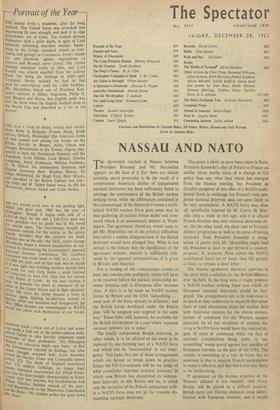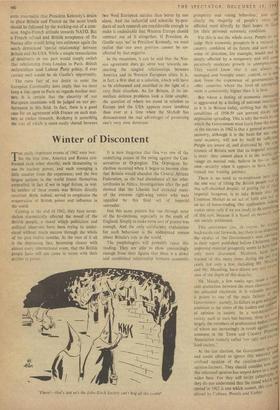NASSAU AND NATO
Tan agreement reached at Nassau between President Kennedy and Mr. Macmillan appears on the face of it (for there are almost certainly secret protocols) to be the result of a compromise. American dislike of independent national deterrents has been sufficiently bated to envisage the continuance of the British nuclear striking force, while the affirmation contained in the communiqué of the intention to create a multi- lateral NATO nuclear force goes some way to that gathering of nuclear forces under one com- mand which is so passionately desired in Wash- ington. The agreement, therefore, would seem to get Mr. Macmillan out of the political difficulties into which a sudden disappearance of the British deterrent would have plunged him. What is less certain is the future; that the significance of the agreement remains obscure is sufficiently indi- cated by the opposed interpretations of it given in Britain and America.
For a reading of the communiqué reveals at least one considerable ambiguity which will have to be resolved before the nuclear relationship be- tween America and its European allies becomes clear. A start is to be made on NATO nuclear forces by Britain and the USA 'subscribing . . . some part of the force already in existence,' and the British forces developed under the Polaris plan 'will be assigned and targeted in the same way.' These latter will, however, be available for the British Government in a case where 'supreme national interests are at stake.'
The totally independent British deterrent, in other words, is to be allowed to die away to be replaced by one forming part of a NATO force and which can be 'unscrambled' in any emer- gency. This looks like one of those arrangements which are bound to break down in practice. Either the US Government will be the judge of what constitutes 'supreme national interests,' in which case Britain has abandoned its indepen- dent deterrent; or else Britain will be, in which case the inclusion of the Polaris submarines with- in a NATO force does not go far towards dis- mantling national deterrents.
This point is likely to have been taken in Paris. President Kennedy's offer of Polaris to France on similar terms marks more of a change in US policy than any other item which has emerged from the Nassau meeting, but President de Gaulle's reception of this offer of a NATO multi- lateral force in exchange for France's own pro- jected national deterrent does not seem likely to be very sympathetic. A NATO force was, after all, specifically rejected by M. Couve de Mur- ville only a week or two ago, and it is official French doctrine that only national deterrents de- ter. On the other hand, the sheer cost of France's defence programme as well as the sense of having extracted from President Kennedy a recog- nition of parity with Mr. Macmillan might lead the President at least to put forward a counter- proposal. If, however, Paris rejects the NATO multilateral force out of hand, then this project is likely to remain a dead letter.
The Nassau agreement, ,therefore, provides in the short term a solution for the British dilemma over Skybolt. In the long term it might produce a NATO nuclear striking force into which all European national deterrents would be inte- grated. The arrangements are to be welcomed in as much as they endeavour to reconcile European fears of total elimination from the nuclear field with American concern for the utmost concen- tration of command for the Western nuclear potential. In all but situations of extreme dis- array a NATO force would have the required de- gree of unity of command, while the fact of national contributions being liable to 'un- scrambling' would guard against any sacrifice of European interests on the part of the USA. The scheme is something of a tour de force, but its weakness is that it requires French participation to make it effective, and that this is not very likely to be forthcoming.
If agreement on the nuclear structure of the Western alliance is not reached, then Great Britain will be placed in a difficult position. British entry into Europe demands some identi- fication with European interests, and it would
seem reasonable that President Kennedy's desire to place Britain and France on the same levels should be followed by the working-out of a com- mon Anglo-French attitude towards NATO. But a French refusal and British acceptance of the Nassau offer would bring into existence again the much denounced 'special relationship' between Britain and the USA. While a simple renunciation of deterrents on our part would simply switch that relationship from London to Paris. British unilateralism (and Labour Party policy, if ever carried out) would be de Gaulle's opportunity.
The mere fact of our desire to enter the European Community does imply that we must keep a line open to Paris as regards nuclear mat- ters. It is certain that the sincerity of our European intentions will be judged on our per- formance in this field. In fact, there is a good case for an agreement with France on such mat- ters as rocket research. Rocketry is something the cost of kvhich is more easily shared between two West European nations than borne by one alone. And the industrial and scientific by-pro- ducts of such research are considerable enough to make is undesirable that Western Europe should contract out of it altogether. If President de Gaulle says 'no' to President Kennedy, we must realise that our own position cannot be un- affected by that negative.
In the meantime, it can be said that the Nas- sau agreement does go some w ay towards un- snarling the tangled relationships between America and its Western European allies. It is, in fact, a first shot at a solution, w bids will have to be elaborated and modified in the light of a very fluid situation. As for Britain, if its im- mediate defence problems look a little simpler, the question of where we stand in relation to Europe and the USA appears more involved than ever at a time when the Skybolt has demonstrated the real advantages of possessing one's very own deterrent.































 Previous page
Previous page